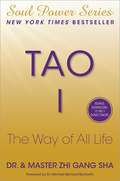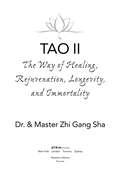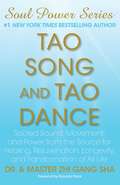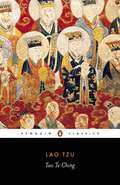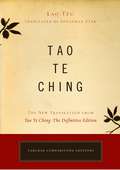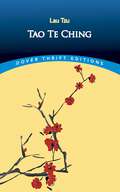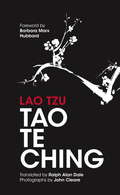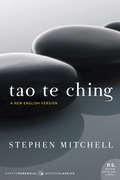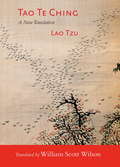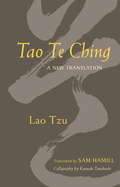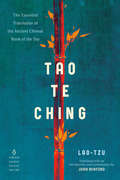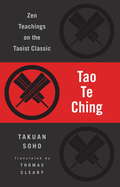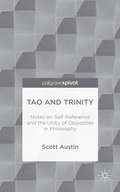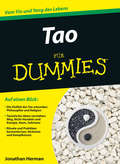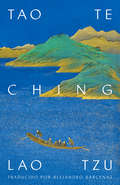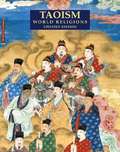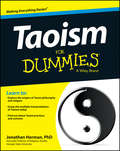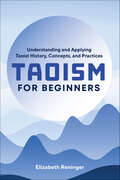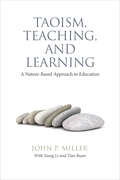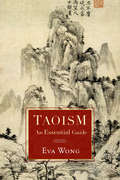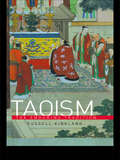- Table View
- List View
Tao I: The Way of All Life
by Zhi Gang Sha Dr.Tao is The Way. Tao is the source of all universes. Tao is the principles and laws of all universes. In the sixth book of the Soul Power Series, New York Times bestselling author Master Zhi Gang Sha shares the essence of ancient teachings of Tao and reveals a new Tao text for the twenty-first century that he received directly from the Divine. These new divine teachings reveal how Tao exists in every aspect of life, from waking to sleeping to eating and more. Master Sha explains how Tao uses the processes of normal creation and reverse creation for all life. He also shares advanced soul wisdom and practical approaches for reaching Tao. In this process, healing, rejuvenation, and life transformation occur. In contrast to the ancient Taoist wisdom, knowledge, and practices, the new sacred teaching in this book is extremely simple, practical, and profound. Studying and practicing Tao has many great benefits, including the ability to: • heal yourself and others, as well as humanity, Mother Earth, and all universes • return from old age to the health and purity of a baby • prolong life Enter the realm of Tao with Master Sha. Your life will be transformed.
Tao II
by Zhi Gang ShaMillions of people are searching for secrets,wisdom, knowledge, and practical techniques to heal, rejuvenate, prolong life, and move toward immortality. The way to accomplish all of these is to reach and meld with Tao. This book, the successor to Tao I: The Way of All Life, reveals the highest secrets and most powerful practical techniques for the Tao journey, which includes one's physical healing and rejuvenation journey and one's entire spiritual journey. Its essence can be summarized in one sentence: Jin Dan Da Tao Xiu Lian is the way to heal, rejuvenate, prolong life, and move in the direction of immortality. Shou Yi Yan Jin Ye is the most important daily practice for reaching Tao. "Shou yi" means focus on the Jin Dan area below the navel. "Yan jin ye" means swallow Heaven's sacred liquid and Mother Earth's sacred liquid. Tao II: The Way of Healing, Rejuvenation, Longevity, and Immortality explains the significance of this highest secret and exactly how to do it. It gives you the sacred key for your whole life's practice and shares two hundred and twenty sacred phrases that include not only profound sacred wisdom but also additional simple and practical techniques. Practice. Practice. Practice. Reach fan lao huan tong, which is to transform old age to the health and purity of the baby state. Prolong life. The final goal is to reach immortality to be a better servant for humanity, Mother Earth, and all universes.
Tao Song and Tao Dance: Sacred Sound, Movement, and Power from the Source for Healing, Rejuvenation, Longevity, and Transformation of All Life
by Zhi Gang Sha Dr.New York Times bestselling author Master Zhi Gang Sha reveals the significance and power of Tao Song, the highest and most profound Soul Song that can transform every aspect of life, and Tao Dance, movement guided by the Source.Tao is the Source and Creator. Tao is The Way of all life. Tao is the universal principles and laws. Tao Song is sound from the Source. Tao Dance is movement from the Source. Tao Song and Tao Dance carry Tao power and ability from the Source. In the ninth book of his revolutionary Soul Power Series, and his third book on Tao, Master Sha reveals new sacred Tao Song mantras that carry Tao frequency and vibration, which can transform the frequency and vibration of all life. Sacred Tao Song mantras and Tao Dance carry Tao love, which melts all blockages; Tao forgiveness, which brings inner joy and inner peace; Tao compassion, which boosts energy, stamina, vitality, and immunity; and Tao light, which heals, prevents sickness, purifies and rejuvenates soul, heart, mind, and body, and transforms relationships, finances, and every aspect of life. Tao Oneness Practice is created and released. Step into the Tao with Master Sha.
Tao Song and Tao Dance: Sacred Sound, Movement, and Power from the Source for Healing, Rejuvenation, Longevity, and Transformation of All Life
by Zhi ShaSacred Sound, Movement, and Power from the Source for Healing, Rejuvenation, Longevity, and Transformation of All Life (Soul Power).
Tao Te Ching
by D. C. Lau Lao TzuIn eighty-one brief chapters, Lao-tzu's Tao Te Ching, or Book of the Way, provides advice that imparts balance and perspective, a serene and generous spirit, and teaches us how to work for the good with the effortless skill that comes from being in accord with the Tao-- the basic principle of the universe.
Tao Te Ching
by Lao TzuTraditionally attributed to Lao Tzu, an older contemporary of Confucius (551 - 479 BC), it is now thought that the work was compiled in about the fourth century BC. An anthology of wise sayings, it offers a model by which the individual can live rather than explaining the human place in the universe. The moral code it encourages is based on modesty and self-restraint, and the rewards reaped for such a life are harmony and flow of life.
Tao Te Ching (Dover Thrift Editions: Religion)
by Lao TzeTao (the Way) is one of the most profound and influential of the world's spiritual traditions, and the Tao Te Ching (The Book of the Way and Its Virtue) has left its imprint on Far Eastern philosophy, art, and literature for over two thousand years. This classic of meditative insight was an important influence on Buddhist thought. Its key tenet is wu-wei, naturalness and simplicity, a mystical path of spontaneity and noninterference that fosters individuality and spiritual freedom.Although Taoism has declined in importance as a formal religion, its spirit of harmony and peace not only permeates art and life in the East but also continues to animate New Age consciousness in the West. This high-quality, inexpensive edition of the authoritative Legge translation will prove invaluable to seekers of enlightenment, students of Eastern religion and thought, and general readers.
Tao Te Ching: 81 Verses by Lao Tzu with Introduction and Commentary
by Barbara Marx Hubbard Ralph Allen Dale'This is an extraordinary book, enlightening and insightful in personal and social realms. Many readers will value it as a work of art, others because of the new meaning it gives to their lives. Dr. Dale's work is, in fact, a treasure for today and for the future.' Milton Schwebel, Ph.D., Professor Emeritus of Psychology, Professional Psychology, Rutgers. The late Ralph Alan Dale translates Tao as the Great Integrity, that is the return to holism, honesty and creativity; our harmony with each other, with the environment and indeed with ourselves. We are perhaps the first generation in the 2500 years since this inspirational book was written, to fully appreciate the words and their message. It resonates with our 21st century hopes, dreams and new capacities as though Lao Tzu had written this remarkable book only for us. This book is presented beautifully, with stunning, atmospheric photographs printed in black and silver to enhance the verses and stimulate the imagination of the reader. A classic work, and a beautiful volume to own and give.
Tao Te Ching: A Graphic Novel
by Sean Michael WilsonA contemporary graphic novel adaptation of a spiritual classic.This graphic-novel version of the Tao Te Ching—the poetic classic that is the philosophical and religious basis of Taoism—brings the teachings into a modern light in a completely fresh and unique way. Each of the 81 poem-passages of the Tao Te Ching is reinterpreted by award-winning graphic novel writer Sean Michael Wilson and brought to life by the artful illustrations of Hong Kong artist Cary Kwok, who sets the text in various contemporary scenes to bring out the modern relevance.
Tao Te Ching: A New English Version (Perennial Classics Ser.)
by Stephen MitchellLao-tzu's Tao Te Ching, or Book of the Way, is the classic manual on the art of living and one of the wonders of the world. In eighty-one brief chapters, the Tao Te Ching llods at the basic predicatment of being alive and gives advice that imparts balance and perspective, a serene and generous spirit. This book is about wisdom in action. It teaches how wo work for the good with the efforless skill that comes from being in accord with the Tao (the basic principle of the universe) and applies equally to good government and sexual love, to childrearing, business, and ecology.The Tao Te Ching is the most widely traslated book in world literature, after the Bible. Yet the gemlike lucidity of the original has eluded most previous translations, and they have obscured some of its central ideas. Now the Tao Te ching has been rendered into English by the eminent scholar and traslator Stephen Mitchell. Mr. Mitchell's Dropping Ashes on the Buddha is a modern Zen classic, and his translations of Rilke and of the Book of Job have already been called definitive for our time.
Tao Te Ching: A New Translation
by Lao TzuRenowned translator William Scott Wilson has rendered Lao Tzu's classic in the most authentic way possible, using both the ancient text and the even older Great Seal script used during Lao Tzu's time. The result is a new and nuanced translation, accompanied by Chinese ink paintings and ancillary material. Wilson includes an introduction that tells the story of Lao Tzu, the "old man" and the "keeper of the archives," and notes to illuminate the text. He also includes two short essays—one explains the relationship between Taoism and Zen, and the other explores the roots that link the spiritual aspects of the Tao with the practice of Chinese and Japanese martial arts. Wilson's version of this ancient classic is wonderfully fresh and readable.
Tao Te Ching: A New Translation
by Sam HamillPart poetry, part paradox, always stirring and profound, Lao Tzu's Tao Te Ching has been inspiring readers since it was written over two thousand years ago. This masterpiece is also one of the most frequently translated books in all of history, in part because the multiple meanings of the Chinese characters make it impossible to translate into a Western language in a strictly literal way. For this reason, many translations are either too loosely interpretive or are too overloaded with notes, thereby losing the clarity of the terse poetry found in the original Chinese. The extraordinary strength of Sam Hamill's translation is that it has captured the poetry of Lao Tzu's original without sacrificing the resonance of the text's many meanings and possible interpretations. The result is a beautiful and deeply meditative rendering, one that is a delight to read over and over again. Accompanying Sam Hamill's translation are seventeen Chinese characters brushed by one of the great masters of calligraphy, Kazuaki Tanahashi. Hamill provides a comment for each character, giving the reader a fuller sense of the richness of the original text and insight into the process of translation itself.
Tao Te Ching: Text Only Edition
by Jacob Needleman Toinette Lippe Lao Tsu Jane English Gia-Fu FengFor nearly two generations, this translation of the Tao Te Ching has been the standard for those seeking access to the wisdom of Taoist thought. Now Jane English and her long-time editor, Toinette Lippe, have refreshed and revised the translation, so that it more faithfully reflects the Classical Chinese in which it was first written, while taking into account changes in our own language and eliminating any lingering infelicities. Lao Tsu's philosophy is simple: Accept what is in front of you without wanting the situation to be other than it is. Study the natural order of things and work with it rather than against it, for to try to change what is only sets up resistance. Nature provides everything without requiring payment or thanks. It does so without discrimination. So let us present the same face to everyone and treat them all as equals, however they may behave. If we watch carefully, we will see that work proceeds more quickly and easily if we stop "trying," if we stop putting in so much extra effort, if we stop looking for results. In the clarity of a still and open mind, truth will be reflected. Te--which may be translated as "virtue" or "strength"--lies always in Tao meaning "the way" or "natural law." In other words: Simply be.
Tao Te Ching: The Essential Translation of the Ancient Chinese Book of the Tao (Cornerstone Of ... Ser.)
by Lao TzuThe original mindfulness book, in a landmark new translation by the award-winning translator of the I Ching and The Art of War The most translated book in the world after the Bible, the Tao Te Ching, or “Book of the Tao,” is a guide to cultivating a life of peace, serenity, and compassion. Through aphorisms and parable, it leads readers toward the Tao, or the “Way”: harmony with the life force of the universe. Traditionally attributed to Lao-tzu, a Chinese philosopher thought to have been a contemporary of Confucius, it is the essential text of Taoism, one of the three major religions of ancient China. As one of the world’s great works of wisdom literature, it still has much to teach us today, offering a practical model based on modesty and self-restraint for living a balanced existence and for opening your mind, freeing your thoughts, and attaining greater self-awareness. With its emphasis on calm, simplicity, purity, and non-action, it provides a time-tested refuge from the busyness of modern life. This new translation seeks to understand the Tao Te Ching as a guide to everyday living and encourages a slow, meditative reading experience. The Tao Te Ching’s eighty-one brief chapters are accompanied by illuminating commentary, interpretation, poems, and testimonials by the likes of Margaret Mead, Ursula K. Le Guin, and Dr. Wayne W. Dyer. Specially commissioned calligraphy for more than two hundred Chinese characters illustrate the book’s essential themes.
Tao Te Ching: Zen Teachings on the Taoist Classic
by Thomas Cleary Lao-Tzu Takuan SohoThis version of the Tao Te Ching presents the classic in a unique light, through the eyes of a renowned master of the Rinzai Zen tradition. Takuan Soho, who lived from 1573 to 1645, was an acerbic, witty, free spirit who; a painter, poet, author, calligrapher, gardener, and a tea master. He was also a confidante and teacher to shoguns and many other powerful and famous figures, among them the the famed swordsman Yagyu Munenori, and (according to legend) Miyamoto Musashi. True to the teachings of the Tao Te Ching itself, as well as to the tradition of Zen, Takuan draws from everyday experience and common sense, to reveal the basic sanity of nature and the inherent wholeness of life. Takuan reveals how the Tao Te Ching applies to a wide range of concerns, including health, personal relationships, and individual lifestyle. He interprets the text through a philosophical and psychological lens, and also elucidates its radical social and political concepts.
Tao and Trinity: Notes on Self-Reference and the Unity of Opposites in Philosophy
by Scott AustinThe Chinese Tao and the Western Trinity have a fundamental unity of theme: the unity of opposites. Both are connected with problems as broad and diverse as how to describe the entire universe, how a system can talk about itself, the relationship between symbols and realities, and the nature of signs and sacraments.
Tao für Dummies (Für Dummies)
by Jonathan HermanSie interessieren sich für die Traditionelle Chinesische Medizin, Feng Shui oder Qi Gong und möchten nun wissen, auf welchen Gedanken all das beruht? Dann ist dieses Buch genau das richtige für Sie. Jonathan Herman, der in Harvard über chinesische Religionen promovierte, erläutert Ihnen, was es mit dem Tao, dem Weg, mit Chi, der Kraft, und dem Yin und Yang auf sich hat, das viel mehr ist als nur der Gegensatz zwischen männlichem und weiblichem Element. Zunächst einmal geht es um die Frage, ob Taoismus eine Philosophie oder eine Religion ist und dann erläutert der Autor die so wichtigen Ideen des Wu Wei, des Nicht-Eingreifens, Nicht-Handelns oder Nicht-Erzwingens, die viele Menschen im Westen in ihren Bann gezogen haben. Und schließlich erfahren Sie, wie durch den Taoismus im Dreiklang mit dem Buddhismus und dem Konfuzianismus all jene Ideen im Westen populär wurden, die für viele heute so anziehend sind. Lassen Sie sich ein auf diesen spannenden Weg.
Tao te ching: The Book Of The Way (Facetas Filosoficas Ser.)
by Lao TzuTraducido al español del chino clásico por Alejandro BárcenasUna guía para vivir en armonía con nosotros mismos y la naturaleza. Esta nueva traducción al español aspira a presentar el Tao Te Ching como una experiencia de lectura lenta y meditativa. &“El Tao Te Ching es sin duda alguna uno de los libros que mayor influencia ha tenido en la historia de la humanidad. A través de su longeva existencia ha servido de inspiración a un sinnúmero de artistas, pensadores, santos, guerreros, líderes políticos, y a muchos otros por igual, en el mundo entero. Su contenido toca una amplia gama de temas de naturaleza universal, los cuales pueden ser caracterizados de manera general como religiosos, filosóficos, místicos, cosmológicos, éticos y políticos. Dicha universalidad ha hecho que su legado se haya podido extender mucho más allá de ser el texto fundacional de un grupo religioso de China, al que con frecuencia se lo conoce como Taoísmo, lo cual ya de por sí le otorgaría un gran honor y le daría intrínsecamente un puesto de notoriedad histórica. Quizás sorprenda el alcance de su fama dado que en realidad se trata de un tratado bastante breve —conocido también como el &“clásico de los cinco mil caracteres&”— y notoriamente complejo. Pero esa complejidad, transmitida por un lenguaje de gran belleza poética, es quizás una de sus grandes virtudes, ya que permite un universo de interpretaciones que transforman a todo aquel que se sumerja en su lectura&”. --De la introducción de Alejandro Bárcenas
Tao te ching: The Definitive Edition (Cornerstone Of ... Ser.)
by Lao TzuTraducido al español del chino clásico por Alejandro Bárcenas Una guía para vivir en armonía con nosotros mismos y la naturaleza. Esta nueva traducción al español aspira a presentar el Tao Te Ching como una experiencia de lectura lenta y meditativa. El Tao Te Ching es sin duda alguna uno de los libros que mayor influencia ha tenido en la historia de la humanidad. A través de su longeva existencia ha servido de inspiración a un sinnúmero de artistas, pensadores, santos, guerreros, líderes políticos, y a muchos otros por igual, en el mundo entero. Su contenido toca una amplia gama de temas de naturaleza universal, los cuales pueden ser caracterizados de manera general como religiosos, filosóficos, místicos, cosmológicos, éticos y políticos. Dicha universalidad ha hecho que su legado se haya podido extender mucho más allá de ser el texto fundacional de un grupo religioso de China, al que con frecuencia se lo conoce como Taoísmo, lo cual ya de por sí le otorgaría un gran honor y le daría intrínsecamente un puesto de notoriedad histórica. Quizás sorprenda el alcance de su fama dado que en realidad se trata de un tratado bastante breve conocido también como el clásico de los cinco mil caracteres y notoriamente complejo. Pero esa complejidad, transmitida por un lenguaje de gran belleza poética, es quizás una de sus grandes virtudes, ya que permite un universo de interpretaciones que transforman a todo aquel que se sumerja en su lectura. --De la introducción de Alejandro Bárcenas
Taoism
by Paula R. Hartz"Provides a concise, accessible overview to the traditions and cultural impact of Taoism, and includes a further reading section, websites section and index."
Taoism For Dummies
by Jonathan HermanThe definitive guide to understanding Taoism--no matter your background or faithLao Tzu's Tao Te Ching is the second most translated book in the world, and the practice of religious Taoism is on the rise in China, where adherents currently number in the hundreds of millions. Yet there remains a remarkable lack of reliable information about Taoism for curious westerners. Taoism For Dummies provides comprehensive coverage of Taoism's origins in China's Chou Dynasty, its underlying quietist principles, its emergence as a major religion, various interpretation of its core texts, including both Eastern and Western interpretations, key Taoist concepts, and much more. It also provides a fascinating glimpse of Taoism in contemporary China.The ideal guide for readers interested in this influential religion, as well as those taking an introductory course on Taoism or Chinese ReligionA valuable source of insight for those with an interest in modern Chinese culture and beliefs
Taoism for Beginners: Understanding and Applying Taoist History, Concepts, and Practices
by Elizabeth ReningerAncient practices for modern lives—the perfect taste of TaoismBegin your journey of spiritual exploration and deepen your connection to the earth. Taoism for Beginners is your easy-to-understand guide to a rich, spiritual tradition that originated in ancient China and offers a new holistic perspective.Discover the core principles and traditions of Taoism with straightforward language and simple exercises you can do anywhere. Adopting aspects of Taoism into your everyday life can bring you into peace and harmony with yourself and the world around you—a practice that's more vital than ever in our busy modern-day lives.Taoism for Beginners helps you:Feel better and feel more—Build your own Taoist practice that can help you relax, de-stress, and feel more at ease in your life.Learn history and tradition—Meet Taoism's founder, Lao Tzu, and learn the basic history of Taoism practice for the past 2500 years.This book and beyond—Deepen your practice (if you wish) with included resources for further reading and study.Explore the depth and breadth of Taoism in a clear format that you can apply to everything you do.
Taoism, Teaching, and Learning: A Nature-Based Approach to Education
by John P. MillerThe ancient Chinese philosophy of Taoism contains profound wisdom about the cosmos, nature, human life, and education. Taoism seeks to be in harmony with nature, and using it as a guide can help us live in a way that is healing to both ourselves and the planet. Taoism, Teaching, and Learning identifies key aspects of Taoist thought and highlights how these principles can promote a holistic approach to teaching and learning. In particular, this book offers educators guidelines and pedagogical examples for how to instil a perspective of interconnectedness into their classrooms. It sheds light on how philosophical Taoism articulates a vision of the universe and life that mirrors the actual realities of nature. Providing frameworks and methods for teaching and learning based on the interconnectedness of life, Taoism, Teaching, and Learning develops an inspiring vision for education and helps us to see our world in a deeply holistic and meaningful way.
Taoism: An Essential Guide
by Eva WongFor the first time, the great depth and diversity of Taoist spirituality is introduced in a single, accessible manual. Taoism, known widely today through the teachings of the classic Tao Te Ching and the practices of t'ai chi and feng-shui, is less known for its unique traditions of meditation, physical training, magical practice and internal alchemy. Covering all of the most important texts, figures, and events, this essential guide illuminates Taoism's extraordinarily rich history and remarkable variety of practice. A comprehensive bibliography for further study completes this valuable reference work.
Taoism: The Enduring Tradition
by Russell KirklandThis clear and reliable introduction to Taoism (also known as Daoism) brings a fresh dimension to a tradition that has found a natural place in Western society. Examining Taoist sacred texts together with current scholarship, it surveys Taoism's ancient roots, contemporary heritage and role in daily life.From Taoism's spiritual philosophy to its practical perspectives on life and death, self-cultivation, morality, society, leadership and gender, Russell Kirkland's essential guide reveals the real contexts behind concepts such as Feng Shui and Tai Chi.
